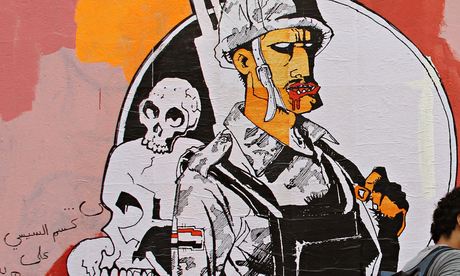
The Army Above All, by the Egyptian street artist Ganzeer. Photograph: Abdelrahman Zin Eldin
Artists from Europe, the US and north Africa support their local counterparts with works critical of the former army chief
Some of the world's leading political artists are stepping up their efforts to produce street works protesting against the actions of Egypt's likely next president, Abdel Fatah al-Sisi.
International graffiti stars such as Sampsa, Ganzeer and Captain Borderline, and the painter Molly Crabapple have begun to create designs incorporating the slogan "Sisi warcrimes" in cities across Europe, the US and north Africa.
The artists say their initiative aims to encourage fiercer international criticism of Sisi's behaviour. World leaders court Egypt's former army chief despite his having ushered in an era of increased oppression after removing the country's former president Mohamed Morsi last July.
"We hope these works will alter the narrative about Sisi," said Ganzeer,aka Mohamed Fahmy, one of the Egyptian artists who rose to global prominence following the country's 2011 revolution.
"It seems like Sisi will easily fool the international community that the majority of Egyptians side with him. All the images getting out there are of squares filled with Sisi supporters, with little to no news of the other side, unless it's of [Morsi's Muslim] Brotherhood. But there are people out there who are opposing who are not part of the Brotherhood."
Sisi's many supporters would dispute Ganzeer's perspective, as it is commonly believed inside Egypt that foreign politicians and journalists have sided against the government that Sisi installed last summer.
Ganzeer and his colleagues, however, feel the international community has done little to censure him and is fully reconciled to his expected election as president next month. They believe that more should therefore be done to shake it from its apathy.
"No Egyptian president will be able to survive without the support of international politicians," Ganzeer said.
The Finnish graffiti star Sampsa was the first artist to create anti-Sisi work outside Egypt. Best known for work that promotes fairer copyright law, Sampsa painted silhouettes signifying the bodies of dead Egyptians on Parisian pavements and a building in New York. The French artistLevalet, the Tunisian calligrapher El Cid and others also have works planned, and the Captain Borderline collective, the founders of Europe's largest street-art festival plan to collaborate with Ganzeer on a large mural in Munich.
New York-based Molly Crabapple will draw work inspired by the cages Egyptian dissidents are locked inside at trial hearings. "I'm disgusted with the way that the Egyptian revolution has been overtaken by a murderous military dictatorship that is in many ways worse than [ousted dictator Hosni] Mubarak," she said.
Ganzeer and his fellow Egyptian artists Zeft and Ammar Abou Bakr will continue to create anti-authoritarian works in Cairo, despite working in a context that is increasingly dangerous – a factor other street artists said had motivated them to show solidarity.
"These guys are the pioneers of modern-day political street art," said Sampsa. "The big stars [outside Egypt] don't give a shit about changing anything these days. But the guys down in Egypt, their work has a point. Their political art comes hand-in-hand with activism."
Previously largely free of artistic expression, Egypt's walls exploded with murals and slogans following Mubarak's removal in February 2011 and the graffiti was portrayed internationally as a symbol of the country's revolutionary gains.
Making graffiti was never easy in the months that followed. The authorities often whitewashed the murals and suspicious bystanders sometimes mobbed the artists, but Ganzeer said it had never been as hard as it is now. The increased policing of public space, a new law curbing protests and a more aggressive public have made artists far more wary.
"The output now is much fewer and far between. People are still doing things, but maybe not with the same outpouring we saw in 2011 when there were new pieces every week," he said. Ganzeer, was arrested in spring 2011 for posting anti-military stickers in public.
Like many of his colleagues, Ganzeer has often created work against the Muslim Brotherhood, but he now fears being taken for a member of the widely-loathed group. "The moment anyone sees you on the street, you're associated with the Brotherhood, and attacked very easily unless you can persuade them that you're creating something pro-military. So it's very difficult to create opposition work that hasn't just been made quickly."
To protect themselves, he and others have developed a technique that sees them add explicitly anti-authoritarian details to their designs only at the last possible moment. While painting a recent mural on Mohamed Mahmoud Street, a road leading from Tahrir Square that is famous for revolutionary graffiti, Ganzeer easily persuaded passersby that the cartoon soldier he had drawn next to a pile of skulls was mourning the deaths of innocent Egyptians. It was only when he added blood to the soldier's mouth and then scarpered that the image, entitled The Army Above All, took on a more sinister meaning.
Since Sisi deposed Morsi last July following days of mass demonstrations, at least 16,000 Egyptian dissidents have been arrested, and thousands killed during protests. The crackdown initially focussed on Morsi's Islamist supporters before expanding to secular-leaning activists.
The government and a sizeable section of society blame the violence on the Brotherhood, and say strong policing is necessary to quell a wave of terrorist activity. Ministers also maintain the country is on the path to democracy, and use May's presidential election to support their claims.
"This is not going to be an autocracy," Egypt's foreign minister, Nabil Fahmy, told the Guardian on Sunday. "If you're not doing it right, we will hold you accountable."

No comments:
Post a Comment